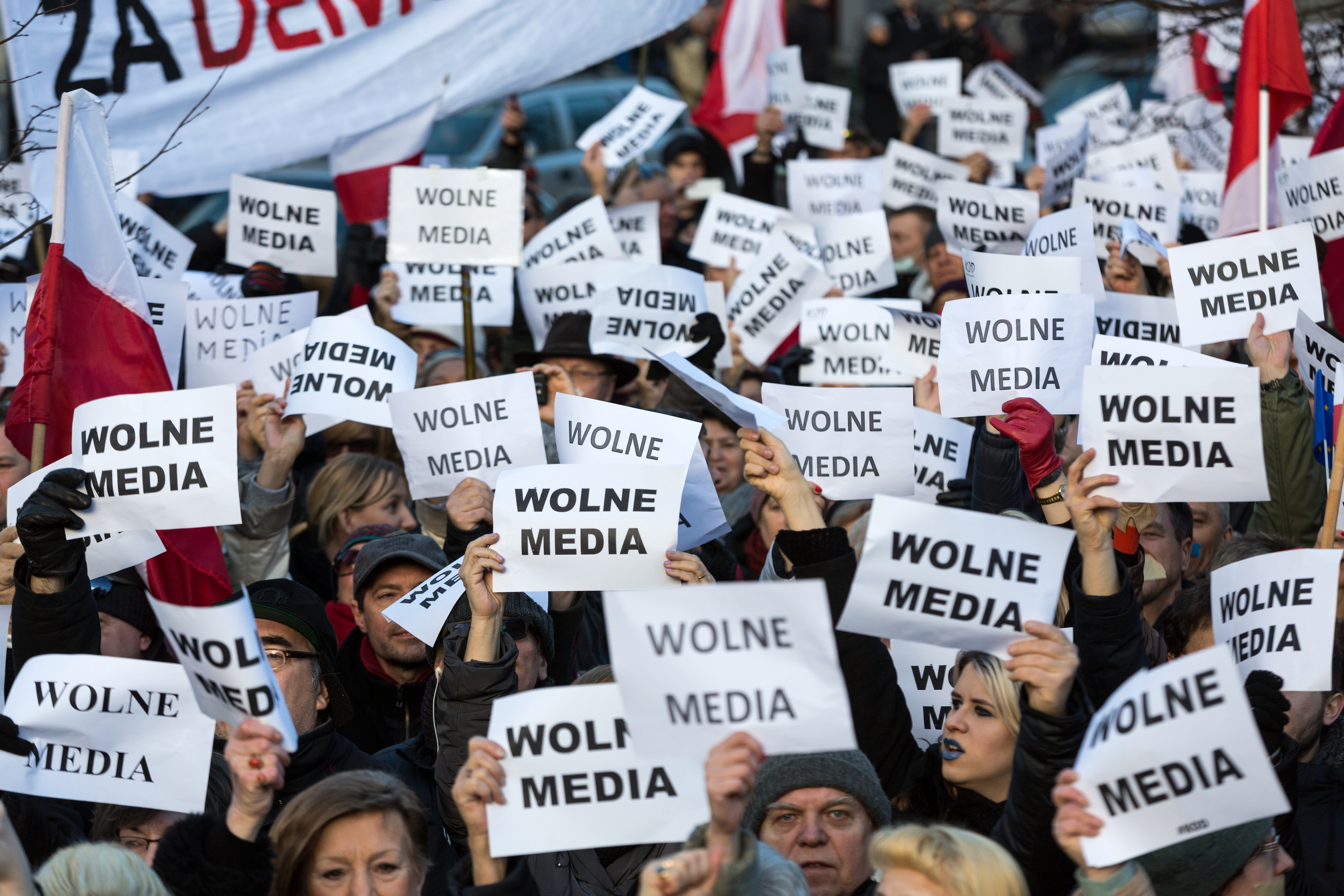Poland’s public broadcaster Telewizja Polska (TVP) continues to face heavy criticism following the 2020 presidential election while the country’s government looks to restrict foreign media ownership.
By Aurora Herrera
The OSCE Office for Democratic Institutions and Human Rights (ODIHR) reported on TVP’s coverage of the first round of the elections saying, “In the pre-election period, the public broadcaster became a campaign tool of the incumbent president, and some materials had a clear xenophobic and anti-Semitic overtone”. The Ethical Journalism Network also published its concerns about TVP commenting, “Public television in Poland has become a propaganda tool of the government.”
The broadcaster’s coverage was panned during the election as lacking impartiality, with 97% of content covering President Andrzej Duda being regarded as positive, with little-to-no room for critical debate.
TVP was also criticised as being utilised by the ruling Law and Justice party (PiS) to carry anti-LGBTQ+ and anti-Semitic messages as part of its electoral campaign. Since then, the LGBTQ+ community has experienced clear discrimination. In fact, according to Euronews, one third of Poland now declares itself “LGBT free” in a move condemned by the European Commission. In that same report, activist Bart Staszewski commented: “He’s [Duda] telling us that we are some kind of demons and is dehumanising us in every corner of his election rally.”
This has become the reputation of TVP. Yet, neither the organisation nor the Polish government have presented any plans to improve the broadcaster’s impartiality, transparency or accountability.
Read more: The decline of public media in Poland
Complaints to the country’s National Broadcasting Council (KRRit) regarding the quality of an election debate broadcast had no satisfactory outcome, leading RSF to comment: “the government has little to fear because the Council is notorious for its inability to defend the independence of the public broadcasters.”
The pro-government slant of TVP has not gone unnoticed by the public. The Reuters Institute Digital News Report 2019 reported that, “The general trend is that private independent media score higher on a trust scale than public service broadcasters acting in recent years more like government cheerleaders”. According to this year’s report, only 39% of people trust TVP as a source of news.
Other media issues
There have also been calls for EU intervention against the breakdown of democratic values in Poland and the lack of an independent public broadcaster. The EU Commission has recently expressed its concerns and threatened sanctions against PiS for its intent to reform the independence of the country’s judiciary.
While the use of sanctions remains unclear, proposals to “re-Polonize” the country’s media landscape will likely exacerbate tensions with the EU. This effectively entails reducing the proportion of foreign owned media companies. Ironically, the Polish government views foreign ownership as a compromise to “independent reporting”, regarding the existence of German ownership in particular as, more or less, “dictates from Berlin”.
According to Reuters: “Poland is ready to craft rules to reduce foreign ownership of media outlets such as newspapers and TV channels.” However, the European Union is against such a move and PiS will have a fight on their hands.
Read more: Threats to media independence continue across Central Europe
The environment for journalists is also an increasingly precarious one. When the Law and Justice party came to power in 2015, Poland’s ranking on RSF’s Media Freedom Index was 18th out of 180 countries. By 2017, it ranked 54th. In this year’s rankings, Poland came in 62nd. Since coming to power in late 2015, the PiS has taken control of TV channels and fired hundreds of journalists from the public broadcaster, replacing them with party loyalists.
According to Freedom House, Poland’s “constitution guarantees freedom of expression and forbids censorship”. However, if convicted of insulting the President, one can receive a jail term of up to three years.
Looking ahead
The health of Poland’s media landscape has declined drastically since PiS came to power and it continues on its downward spiral, with proposed “repolonisation” likely to efface necessary media pluralism.
Independent public media must be part of a plural media landscape. It also has a mandate to represent and be accountable to diverse audiences and the use of TVP to spread hate is the very antithesis of core public media values. Without independence, TVP will never be able to achieve a mandate of transparency, accountability, diversity and pluralism.
The Public Media Alliance strongly condemns the use of public media for the spreading of hate speech and calls for the reformation and independence of TVP from the Polish government.
Header Image: Warsaw, Poland, May 2016. flags under the building TVP in Warsaw. Credit: Grand Warszawski/iStock
Related Posts
3rd July 2019
Threats to media independence continue across Central Europe
“Backslide”. This seems to be the word…

